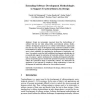Free Online Productivity Tools
i2Speak
i2Symbol
i2OCR
iTex2Img
iWeb2Print
iWeb2Shot
i2Type
iPdf2Split
iPdf2Merge
i2Bopomofo
i2Arabic
i2Style
i2Image
i2PDF
iLatex2Rtf
Sci2ools
CAISE
2015
Springer
2015
Springer
Extending Software Development Methodologies to Support Trustworthiness-by-Design
People are increasingly concerned about the trustworthiness of software that they use when acting within socio-technical systems. Ideally, software development projects have to address trustworthiness requirements from the very early stages of development using constructive methods to enable trustworthiness-by-design. We analyze the development methodologies with respect to their capabilities for supporting the development of trustworthy software. Our analysis reveals that well-established development methodologies do not specifically support the realization of trustworthy software. Based on findings, we propose a generic mechanism for extending development methodologies by incorporating process chunks that represent best practices and explicitly address the systematical design of trustworthy software. We demonstrate the application of our approach by extending a design methodology to foster the development of trustworthy software for socio-technical systems.
Related Content
| Added | 17 Apr 2016 |
| Updated | 17 Apr 2016 |
| Type | Journal |
| Year | 2015 |
| Where | CAISE |
| Authors | Nazila Gol Mohammadi, Torsten Bandyszak, Sachar Paulus, Per Håkon Meland, Thorsten Weyer, Klaus Pohl |
Comments (0)

